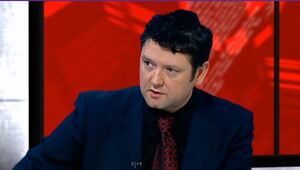[Solicitor and Chair of Law Society Human Rights Committee Michael Finucane, who is also son of murdered solicitor Pat Finucane and Sunday Times security correspondent John Mooney on TV3’s Tonight With Vincent Browne last night]
Last night Cormac Ó hEadhra stood in for Audrey Carville on RTÉ’s Late Debate while the panel included Mary Lou McDonald, Sinn Féin TD; Alan Farrell, Fine Gael TD; Michael Finucane, solicitor; and Mark Kelly, Director, Irish Council for Civil Liberties.
During their discussion Mr Finucane outlined the serious implications of the the recording of incoming and outgoing Garda station calls, from the point of view of people arrested and convicted, and their solicitors.
Later, on TV3’s Tonight with Vincent Browne, Mr Mooney – who broke the GSOC bugging story – hinted that there are other matters of concern in relation to separate to that of the solicitor/client concerns.
From the Late Debate discussion:
Cormac Ó hEadhra: “Michael Finucane, when Alan Farrell was talking about the GSOC report not being noticed by the Minister [for Justice Alan Shatter] or his department, you were shaking your head, why?”
Michael Finucane: “Well [Alan Farrell] called it a press release. I mean I’m sitting here looking at a section, or an an extract from it, and it’s entitled ‘Report in accordance with section 103 of the Garda Síochána Act’. It’s not a press release and to minimise it and try to sort of downplay the significance of the whole episode that exposed the practice of recording phonecalls at all is disingenuous. This was in the context of Garda officers being prosecuted for assaulting a man in custody so I mean it’s ludicrous to suggest that the minister wouldn’t have been aware of that case.”
Ó hEadhra: “He said he simply wasn’t and he also said that GSOC themselves didn’t feel that the report was important enough to send him a copy.”
Finucane: “This prosecution was the first successful prosecution brought by GSOC against serving members of An Garda Síochana, certainly for indictable offences, if not the first then one of the first. I mean if we’re going to talk about competence of office holders, if you’re not aware of the detail of that investigation and that prosecution then you’re seriously into incompetence territory.”
Talk over each other
Finucane: “Before Alan comes back in with, you know, in sort of another ‘let’s defend the Government line, I think we do need to move this on because the sum total of what has happened over the last number of months with regard to our police force, the people that the citizens look at as the frontline representative face of the State, what has happened, if you think about this in terms of what a police officer does, their job: their road traffic practices have been seriously called into question, the quality of their criminal investigation in more serious offences has been called into question by members of An Garda Síochána, they’ve been accused of bugging the watchdog organisation, the Ombudsman Commission; they’ve been accused or seriously suspected of having illegally recorded phonecalls which may include phonecalls between arrested and detained persons and their solicitors. And right at the top of the organisation is the Garda Commissioner who eventually, after defending all of this tooth and nail was forced to resign. Now what must an Irish citizen feel when they look and see a Garda in uniform after all of this has happened. We do not need some sort of parliamentary seeping-under-the-carpet exercise of statutory tinkering and reform and revision. There needs to be root and branch reform of something meaningful in the way that people deal with An Garda Síochána so that they can see for themselves that things have changed and it needs to happen quickly.”
Later
Ó hEadhra: “Michael, are you reviewing clients now?”
Finucane: “Actively. And I would say anyone with a criminal defence practice, who’s been representing people that were detained in Garda custody for the purposes of police interview is doing exactly the same because of the way the detention regime is operated by An Garda Síochána in this country, the solicitors are not permitted to remain with their clients while they’re being interviewed so you can go to the Garda station to advise someone but then you have to leave again when they’re being interviewed and the dynamic of the situation requires telephone contact and, with your client, it’s unavoidable. And because people are detained these days for longer and longer periods of time, you can find yourself speaking to a client early in the morning or right up until midnight and sometimes even beyond midnight in certain circumstances so it’s often not possible or practical to go to a Garda station so you’re reliant on the telephone.”
Ó hEadhra: “Are we talking then about a huge number of convictions likely to be appealed?”
Finucane: “Well it’s too early to say, it’s too early to say how many cases will reach the stage of appeal but I think we can assume, with a reasonable degree of confidence that a huge number of cases are going to have to be reviewed and I think one thing the Government needs to do urgently is to decide and explain how that review is going to take place. Who’s going to do it? And most important of all how it is going to be demonstrably independent of any agency with any potential of interest in the outcome. So no Garda involvement, no DPP involvement, no Justice Ministry involvement, demonstrably, completely and effectively independent of any agency that has a role in prosecution.”
Ó hEadhra: “Can I make a massive leap if you don’t mind, let’s say a conviction, let’s say there is an appeal and evidence was, should have been inadmissable and the conviction is quashed, what happens then is it a retrial or is the person free to go?”
Finucane: “Well there’s a number of possibilities but I think, I mean I think, all of those things are possible aswell as the revelation of a huge number of miscarriages of justice, people are convicted of things wrongly as a result of evidence or information that was gathered by An Garda Síochána through listening to confidential conversations between people and their solicitors.”
Ó hEadhra: “And then are we talking, possibly, and this is another leap, civil action against the State and a huge amount of compensation.”
Finucane: “A fair degree down the road, yes, but that is a possibility but..which is why I say action needs to be taken swiftly and so that the process of review at least can begin as quickly as possible.”
Meanwhile, on Tonight With Vincent Browne:
John Mooney: “I’d be pretty confident that this story has a few twists and turns and will have by next week.”
Vincent Browne: “Have you ever heard about this, in all your dealings with the gardaí over the years, did you ever hear that incoming and outgoing calls to garda stations were being recorded?”
Mooney: “Surveillance in this country is a free-for-all, there’s all sorts of fun and games going on outside the normal system and within the legislative system. Technology, legislation isn’t able to keep up with technology, it’s just..”
Browne: “This is…landlines have been recorded apparently…”
Mooney: “Yeah but from 2008 they were doing it with a digital apparatus which is a different kettle of fish to tapes and it’s much more open to, I suppose, very targeted use and that kind of thing, those systems are in place.”
Browne: “In other words, for instance when the posh voice of a solicitor would come on the phone that they’d be able to pick that up immediately and record it, is that it?”
Mooney: “I’m not so convinced that these matters all relate to solicitors because solicitors, by and large, will not…”
Browne: “I thought you were going to challenge me on solicitors all having posh voices but em..”
Mooney: “I don’t believe that many solicitors would, they may be advising their clients but it’s usually to say nothing. I’ve yet to meet a criminal defence lawyer. I think there are other issues.”
Browne: “What?”
Mooney: “Well, I’m not going to go into them but I think there are…”
Browne: “Ah go on, give us an idea?”
Mooney: “Buy the paper on Sunday, Vincent, but I think there are other issues that are at play here that may have not come into the public domain.”
Later
Mooney: “By and large, I would interpret Alan Shatter’s apology as almost like a flare, it’s acted as a detraction from other issues that are far more serious and I think Enda Kenny is now fairly put himself squarely in the line-up as in responsibility for some of these actions and activities that are going on. For example, I have yet to get any explanation as to why the Taoiseach communicated with the Secretary General of the Department of Justice [Brian Purcell] and send him to deal with Martin Callinan and, somehow, Alan Shatter was left out of that. Alan Shatter is the line manager that Brian Purcell would answer to. It seems an extraordinary state of affairs that you would have the Secretary General answering directly to the Taoiseach because there’s no relationship there and, effectively, as Fianna Fáil alleged today going off and giving the Commissioner an ultimatum to either go or, as they’re officially stating, express his displeasure and concern about what was happening. I think this is major, major, major..”
Browne: “It raises the question about Máire Whelan [the Attorney General] telling him something that Enda Kenny thought was extraordinary, leading to representations to the Commissioner and eh..”
Mooney: “I think it’s also very noteworthy, Vincent, you can’t..Enda Kenny, I think said something in the Dáil today that possibly he didn’t realise the import of what he was saying, was that the Attorney General wouldn’t discuss this issue with him on a phone.”
Listen back to Late Debate here
Watch Tonight With Vincent Browne here
Gareth Chaney/Photocall Ireland



